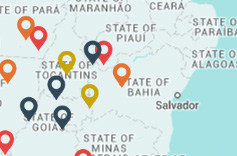Puxirão of Faxinalense Peoples Articulation
The right to fight: education for the defense of the faxinalenses’ rights
Paraná
The mission of the Puxirão(1) of Faxinalense(2) Peoples Articulation is to articulate and mobilize faxinalenses’ communities for the defense and promotion of their ethnic and collective rights seeking access to and protection of natural resources and maintenance of their territoriality.
Among its activities, the articulation seeks social visibility for faxinalenses’ communities through the production of social self-cartographies and mapping of the faxinais in the state. As a consequence, it allows communities to identify their territory and social antagonists, as well as the conflicts that make it difficult to maintain their traditional way of life. The group fights for the realization of the fundamental rights to social reproduction by formulating and defending State and Municipal laws and decrees, and forwarding many complaints and lawsuits of human rights violations to Prosecutor’s Offices and government institutions. It seeks the social emancipation of faxinalenses through training courses on rights in communities.
The Project
The aim of the project supported by Brazil Fund is to promote training on rights for faxinalenses, enabling them to be better able to claim those rights, giving them autonomy to address their demands. 1,445 faxinalenses’ families from six communities located in the cities of Rebouças, Turvo, São Mateus do Sul, Pinhão, Quitandinha and Prudentópolis, in the state of Paraná, will be involved in training activities.
Faxinais are a system of environmental management and social organization typical of the cabocla culture from the center-south region of Paraná State. Formed in the early twentieth century, they have an organization based on the collective use of the land in a pastoral grazing system, through the establishment of communitarian breeding sites which is clearly sustainable. The faxinalenses promote a sustainable management of the Araucaria forest and ensure the survival of families of different economic levels with equity.
With the introduction of the green revolution model in agriculture from the 1970s, a generalized process of distortion of family agriculture was observed in Brazil. In the case of the faxinais the pressures for the re-conversion of their production systems to chemical monoculture, as well as the pressures of logging and paper companies in the region led to a strong process of disintegration, promoting the ‘dismantling’ of the communitarian breeding sites, the change of the forest environment and the expulsion of hundreds of families to the cities.
Currently many faxinalenses are organized in the fight to preserve their traditions, based on sustainability, preservation of the Araucaria Forest and dignified life for everyone in the group. Therefore, trying to circumvent what has been imposed by the cultivation of monocultures such as pines and eucalyptus. The articulation participates in the Puxirão of Peoples and Traditional Communities Network of Paraná.
(1) N.T.: Puxirão is a typical term in southern Brazil related to the completion of the harvest and the idea of solidarity and collective action.
(2) N.T.: Faxinalenses are members Faxinais which are rural communities who settled in south-central Paraná. They are historically constituted as a self-defense mechanism of the local peasants seeking to ensure their social reproduction in times of crisis between mid-nineteenth century and the decade of the 30s of the twentieth century. Such communities have their own peculiar form of ownership of their traditional territory, based on the communal use of the animal breeding areas, forestry and water resources and the private use of crop areas.
Funding Line
Annual Call for Proposals
Year
-
Total Granted
-
Duration
-
Main Themes
Rights of Maroon and Traditional Populations






